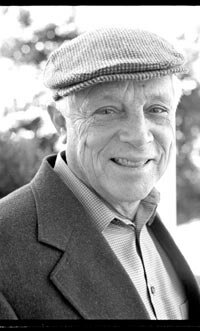No more Mr. Neutral: Collins ready to blow the whistle
Since he moved here more than 30 years ago, Rich Collins has been raising environmental hell. "I came from Oregon, where we were so far ahead," he says. "I was shocked to see how retarded" environmental awareness was in Virginia.
For instance, Allied Chemical was dumping a pesticide– Kepone– into the James River in the '70s. The upside to that environmental disaster for Collins, who worked at UVA's School of Architecture, was that the judge ordered Allied to fund an endowment as part of the settlement. Thus was born the Institute for Environmental Negotiation, which Collins founded in 1981.
"The fact that I came walking down the street at the same time they had that money to use, $7 to $8 million– well, half of life," he says with a nod to Woody Allen, "is just showing up."
What's environmental negotiation, and why is it in the School of Architecture?
Collins acknowledges the negotiation aspect was considered marginal in a field where design reigns. But he could tell that planners would become more and more important as mediators, particularly with the National Historic Preservation Act, "which indicated people cared about places," and the National Environmental Policy Act, which required the government to explain the environmental impact of roads.
Initially, "I was chasing ambulances, reading in the paper about land use and environmental issues, and saying, 'I can assist you' rather than going to court."
A study on uranium mining in Virginia was the turning point where Collins showed that face-to-face encounters led to better decisions.
Since then, the Institute has been involved in more than 300 environmental projects. "We were instrumental in the Chesapeake Bay Protection Act," he boasts. And that was at a time when it seemed inconceivable that the state of Virginia would compromise property rights to protect the environment.
Collins is pleased that the Institute has never taken any corporate funding, thanks to the Virginia Environmental Endowment. Fundraising may be in its future, however, and that's why a November 19 symposium will celebrate the Institute's 25th anniversary and Collins' upcoming retirement.
Although he's never been shy about expressing his position on local issues– he argued against creation of Fashion Square Mall (claiming it would crush downtown)– retirement will give Collins even more freedom to fight. He opposes the Meadowcreek Parkway and unlimited growth in Albemarle with groups he's helped found such as STAMP (Sensible Transportation Alternatives to the Meadowcreek Parkway) and ASAP (Advocates for a Sustainable Population).
Because, even after all the international conferences he's attended, Collins is still a firm believer in local activism. "Most good ideas come from citizens who get angry– not from professors in classrooms," he says.
And while he's been successful as a mediator, he's no longer going to maintain the appearance of neutrality: "I'm going to go out and blow the whistle and not have to cater anymore."
You go, Rich.
Age: 70
Why here? Moved from the University of Oregon to join faculty of Federal Executive Institute in 1971. Stayed here when University of Virginia School of Architecture offered me a professorship in 1974.
Worst about living here? Fatalistic "growth is inevitable" attitude among many citizens that unduly limits our capacity to shape the community's future.
Favorite hangout? Alderman Library's new-book section and coffee shop
Most overrated virtue? Sobriety
People would be surprised to know: I never bluff when I play poker.
What would you change about yourself? I'd be less profane with technologies that fail me when I need them. Like this computer, for example.
Proudest accomplishment? Award from University of Wisconsin, La Crosse, my alma mater, as Distinguished Alumnus of 1990
People find most annoying about you: Too talkative
Whom do you admire? My old radio operator buddy and Air Force roommate, Johnny Cash, who became more genuine and more talented the older he got. (See the recently published authorized biography, A Man Named Cash, in which I discuss John's Korean Air Force days.)
Favorite book? J. D. Salinger's Catcher in the Rye. And to hell with Jonathon Yardley's wussy criticism of it.
Subject that causes you to rant? Catechism books, especially in required university economic courses.
Biggest 21st-century creep out? Abu Ghraib fiasco
What do you drive? 1999 VW Passat
In your car CD player right now: Six-CD disc in trunk, with Rolling Stones' Exile on Main Street, Tony Bennett's Best, and Mahler's 3rd symphony among them.
Next journey? In February, to join for the eighth time some European friends for a week of skiing in the Italian Dolomites
Most trouble you've ever gotten in? Conviction for disorderly conduct in my college days, in spite of serving brilliantly as my own counsel
Regret: Not continuing to play the violin
Favorite comfort food: Spice drops
Always in your refrigerator: Cold beer and Gaeta olives
Must-see TV: Bill Maher
Favorite cartoon: Doonesbury
Describe a perfect day. A little paddlin', a little music, a little Tullamore Dew, and a little lovin'
Walter Mitty fantasy: I win the Davis Cup for the U.S. with a sizzling cross-court backhand.
Who'd play you in the movie? Mickey Rourke
Most embarrassing moment? St. James football team shower and all the linemen have pubic hair and I don't.
Best advice you ever got? Keep your eye on the ball no matter what game you're playing.
Favorite bumper sticker? Think globally, act locally.

PHOTOS BY JEN FARIELLO

PHOTOS BY JEN FARIELLO
#